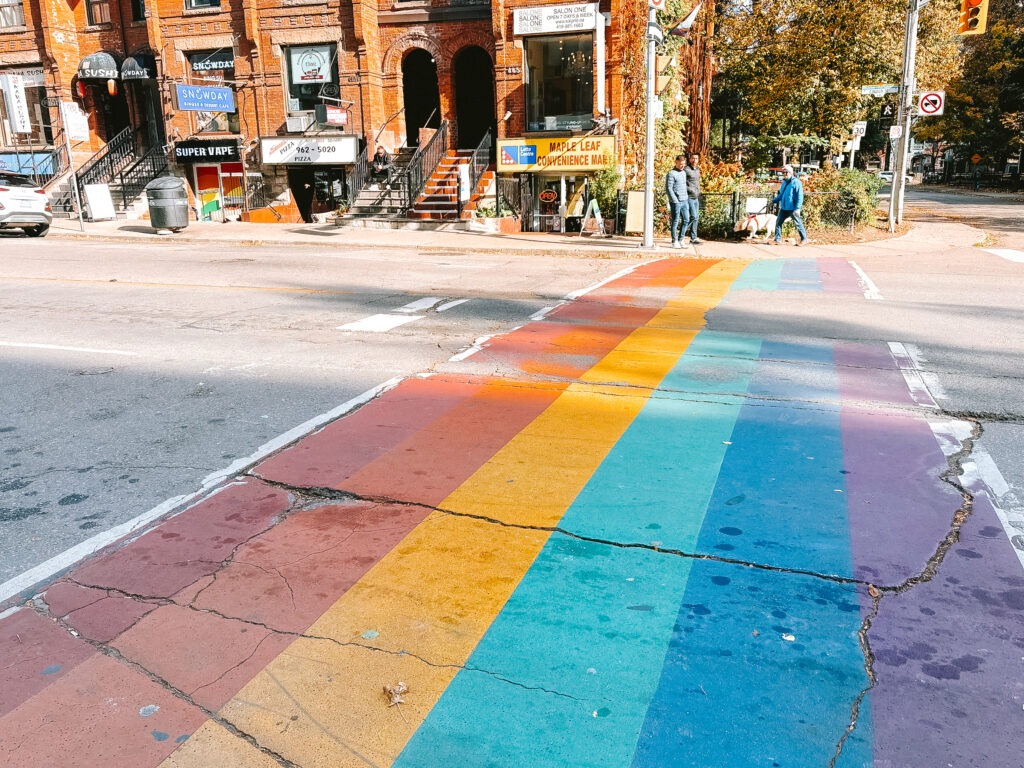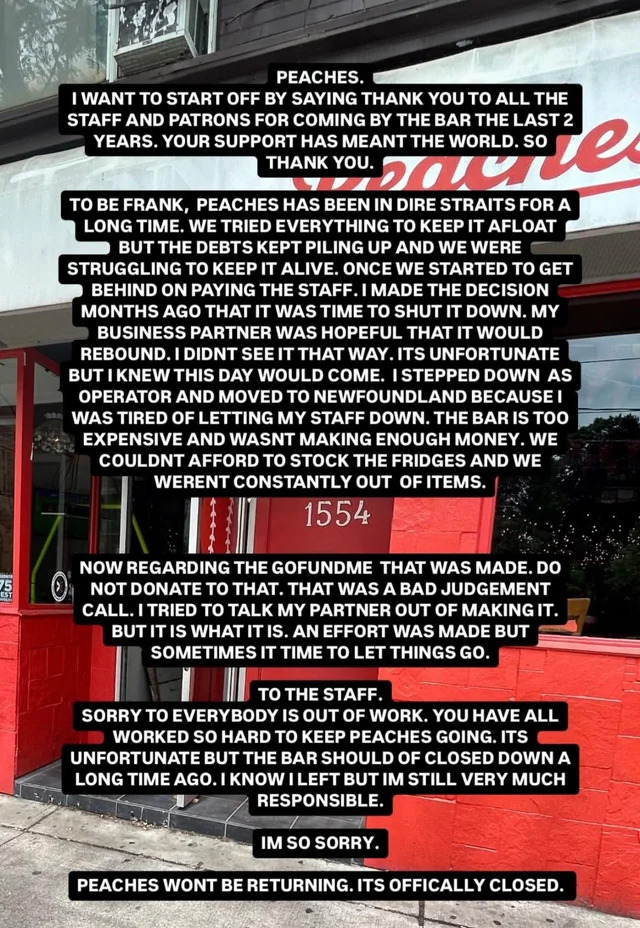
Listen to the whole story here:
Queer sports bar Peaches has closed its doors leaving queer Torontonians with one less place to connect in diverse and inclusive queer spaces.
The sudden closure comes after owners Veronica Sayes and Anthony Fushell posted on social media that they were facing financial struggles – including juggling debt and being behind on paying employees.
In a statement on a now deleted Instagram account last week (see screencap below), co-owner Sayes, wrote that “trust was put in places it should not have been, there were people that took advantage of me being a new business owner.”
She writes that the bar “is too expensive and wasn’t making enough money… Once we started to get behind on paying staff, I made the decision months ago that it was time to shut it down.”

According to Cris Nippard, the programming and outreach lead at The Queer Space, this isn’t the first time they’ve heard of queer businesses in Toronto forced to reach out to their community to save their spaces because the city falls short of its promise to support queer spaces.
Instagram users have been showing support, with @truterrors commenting, “the way that people hold queer and small businesses to impossible standards with no room to f**k up or grow is such a huge bummer.”

According to the City of Toronto website, they offer some funding resources to queer businesses, like implementing and upholding the 2SLGBTQ+ Advisory Committee. The committee ensures “the interests and needs of the diverse 2SLGBTQ+ communities are reflected in city programs and service delivery.”
“There is no space for us, [and] the spaces we have are the spaces we fight for and have to make for ourselves. Especially for WLW, and nonbinary individuals,” said Chantelle Wright, creator of About Last Night, an organization that hosts parties and events for the lesbian and nonbinary communities. “In terms of queer spaces I think we as a whole (community) have given up on that dream.”
Financial struggles aren’t a new barrier facing the city’s queer community.
According to their website, GladDay Bookstore is the oldest queer bookstore in the world and a familiar storefront in Toronto’s Gay Village – the Church and Wellesley 2SLGBTQ+-oriented enclave.
They almost suffered a similar fate to Peaches, but successfully rallied their community to fundraise money and “prevent and avoid” a crisis in May of this year.
According to Nippard, although the city does show some support for the queer community, spaces are often made for one type of queer – which is why the closure of diverse queer locations is so damaging to the community.
“It comes down to the fact that there aren’t enough inclusive queer spaces. So, there are a lot of spaces in Toronto specifically for cis, white, gay men. We hear a lot about the lack of sapphic spaces, lesbian spaces, trans inclusive spaces, accessible spaces that are also queer… so there is a lot of ‘one kind’ of space,” they said.
According to Wright, Peaches represented a safe place for queer folks to watch sports and feel included in a hobby so greatly centered around the cis male gaze.
“Women’s sports…I can’t really explain it but you feel like you’re a part of something much bigger. And that’s how it felt walking into Peaches. You were supporting other women, for the first time you’re seeing professional women’s sport on TV, you’re seeing the last name of a woman stitched onto the backs of jerseys that almost every single person seemed to be wearing,” she said.
Wright says in terms of funding, queer collectives seem to only really matter come June for pride month, an almost ‘tokenistic’ approach to supporting the queer community.
Nippard agrees, stating that they’re not surprised the city does a poor job in maintaining queer spaces.
“When a large group of citizens in your city are not having their needs met, there needs to be an allocation of times and funds put forward to see what you can do to help and this lack of queer space has been a problem for so long thats its long overdue for the city to figure it out,” they said.
The Canada’s 2SLGBTQI+ Chamber of Commerce (CGLCC) is one resource that provides programming for 2SLGBTQ+ small businesses.
On their website, they write that they seek to connect “2SLGBTQI+ businesses to a global network… facilitate connections that can build a more inclusive Canada… [and] serve businesses looking to form more inclusive cultures or programming, offering inclusivity training and market-preparedness training for serving 2SLGBTQI+ clientele.”
Although these services can open the doors for queer businesses, Wright and Nippard say more support for Toronto’s queer community is needed to sustain inclusive and safe 2SLGBTQIA+ spaces as they continue to exist.
“Getting marginalized queer people in politics and keeping them there is the best way to have our opinions represented, [and] creating specific funding to ensure LGBTQ spaces are not shutting down,” said Nippard.
Reporter, On The Record, Fall 2024.
This article may have been created with the use of AI tools such as Google Docs, Grammarly, and/or Otter.ai for transcription.

